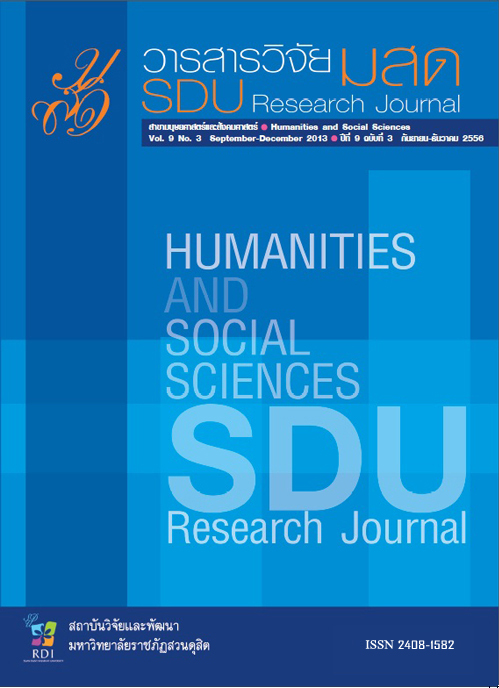ต้นแบบการจัดกิจกรรมฝึกวิชาชีพเพื่อสร้างรายได้สำหรับผู้สูงอายุในภาคตะวันออกเฉียงเหนือของประเทศไทย
Keywords:
ต้นแบบการจัดกิจกรรมฝึกวิชาชีพ, การสร้างรายได้, ผู้สูงอายุAbstract
บทคัดย่อ
การวิจัยเรื่องนี้ มีวัตถุประสงค์เพื่อ 1) เปรียบเทียบความต้องการต่อการฝึกวิชาชีพเพื่อสร้างรายได้ของผู้สูงอายุ ด้านความรู้ ด้านทักษะ และด้านทัศนคติ จำแนกตามสถานภาพของผู้สูงอายุ 2) พัฒนาต้นแบบการจัดกิจกรรมฝึกวิชาชีพเพื่อสร้างรายได้สำหรับผู้สูงอายุในภาคตะวันออกเฉียงเหนือของประเทศไทย และ 3) จัดทำหลักสูตรการพัฒนาศักยภาพของผู้สูงอายุและการสร้างอาชีพในการพึ่งพาตนเองได้อย่างยั่งยืนและดำเนินการวิจัยโดยใช้การวิจัย เชิงปฏิบัติการแบบมีส่วนร่วม(Participatory Action Research: PAR)โดยวิธีการแบบผสมผสาน ทั้งการวิจัยเชิงปริมาณ และการวิจัยเชิงคุณภาพ กลุ่มตัวอย่าง คือ ผู้สูงอายุในจังหวัดนครราชสีมา จังหวัดสุรินทร์ และจังหวัดมุกดาหาร รวม 400 คน ผู้ให้ข้อมูลสำคัญ ประกอบด้วย ผู้นำชุมชนจำนวน 12 คน นักพัฒนาชุมชนหรือนักวิชาการศึกษาในพื้นที่ จำนวน 3 คน หอการค้าจังหวัดนครราชสีมา และร้านค้า จำนวน 3 คน รวม 18 คน เครื่องมือที่ใช้ในการรวบรวมข้อมูล คือ แบบสัมภาษณ์ที่มีค่าความเชื่อมั่นทั้งฉบับตามวิธีของครอนบาค เท่ากับ .83 แบบประเมินความรู้แบบทดสอบทักษะ เก็บรวบรวมข้อมูลโดยการสังเกต การสัมภาษณ์แบบเจาะลึก การใช้เทคนิคกระบวนการพลังสร้างสรรค์ และการประชุมสนทนากลุ่ม สถิติที่ใช้ในการวิเคราะห์ข้อมูล เชิงปริมาณ คือ ความถี่ ร้อยละ ค่าเฉลี่ย ส่วนเบี่ยงเบนมาตรฐาน สถิติทดสอบที การวิเคราะห์ความแปรปรวนทางเดียว และวิธีเชิงคุณภาพใช้การวิเคราะห์เนื้อหา
ผลการวิจัยพบว่า
1. ความต้องการต่อการฝึกวิชาชีพเพื่อสร้างรายได้ของผู้สูงอายุ ในภาพรวม อยู่ในระดับ มากที่สุด และเมื่อพิจารณาเป็นรายด้าน พบว่า ทุกด้านอยู่ในระดับมากที่สุด อันดับแรก ได้แก่ ด้านทัศนคติ รองลงมาคือ ด้านทักษะ และด้านความรู้ ตามลำดับ เมื่อเปรียบเทียบความต้องการ ต่อการฝึกวิชาชีพเพื่อสร้างรายได้ของผู้สูงอายุ ด้านความรู้ ด้านทักษะ และด้านทัศนคติ จำแนกตามสถานภาพของผู้สูงอายุ พบว่า ผู้สูงอายุที่มีเพศ ระดับการศึกษา รายได้ที่รับปัจจุบันต่อเดือน และสถานภาพความเป็นอยู่ต่างกัน มีความต้องการต่อการฝึกวิชาชีพเพื่อสร้างรายได้ของผู้สูงอายุ ในภาพรวมและรายด้าน ไม่แตกต่างกัน
2. การดำเนินการพัฒนาต้นแบบต้นแบบการจัดกิจกรรมฝึกวิชาชีพเพื่อสร้างรายได้สำหรับผู้สูงอายุในภาคตะวันออกเฉียงเหนือของประเทศไทยโดยผ่านกระบวนการมีส่วนร่วม 4 ขั้นตอนคือ การวางแผนการปฏิบัติตามแผนการสังเกตผล และการสะท้อนผล สรุปได้ดังนี้
ขั้นที่ 1 การวางแผน พบว่า เกิดปัญหาทั้งหมด 7 ปัญหา โดยได้วางแผนปัญหาที่พบมากที่สุด 3 ประเด็นหลัก คือ ผู้สูงอายุมีการว่างงานจำนวนมาก ขาดเงินทุนในการทำกิจกรรมเพื่อสร้างอาชีพเสริม และขาดการสนับสนุนทางสังคม
ขั้นที่ 2 การปฏิบัติตามแผน พบว่า เกิดการคัดเลือกแกนนำผู้สูงอายุ เพื่อประสานงานในการดำเนินงานฝึกวิชาชีพ หน่วยงานที่เกี่ยวข้องทั้งภาครัฐ เอกชน และสถาบันการศึกษาร่วมสนับสนุนการฝึกวิชาชีพโดยมีการจัดเวทีประชาคมเพื่อแลกเปลี่ยนความรู้ร่วมกัน
ขั้นที่ 3 สังเกตผล หน่วยงานทั้งภาครัฐ เอกชน และสถาบันการศึกษาได้มีส่วนร่วม ในกระบวนการฝึกวิชาชีพ เกิดการรวมกลุ่ม ประสานความร่วมมือซึ่งกันและกันในการปฏิบัติกิจกรรมมากขึ้น และเปิดโอกาสให้ทุกส่วนได้เข้ามาร่วมในการเป็นสมาชิกของ SME เพื่อสร้างเครือข่าย การลงทุน การประกอบอาชีพ และการตลาด
ขั้นที่ 4 สะท้อนผล พบว่า ผู้สูงอายุ จำนวน 60 คน หลังจากฝึกวิชาชีพมีความรู้ และทักษะเพิ่มขึ้นก่อนฝึกวิชาชีพ ส่วนทัศนคติของผู้สูงอายุได้เกิดการแลกเปลี่ยนความรู้และการพัฒนาทักษะ
3. หลักสูตรการพัฒนาศักยภาพของผู้สูงอายุและการสร้างอาชีพในการพึ่งพาตนเองได้ อย่างยั่งยืน ประกอบด้วย กำหนดหัวข้อวิชาที่ฝึกวิชาชีพ พบว่า ผู้สูงอายุส่วนใหญ่อยากให้จัดกิจกรรมฝึกวิชาชีพด้านการจักสาน จุดประสงค์เชิงพฤติกรรม เพื่อให้ได้ต้นแบบหลักสูตร ฝึกวิชาชีพ (จักสานตะกร้าลายสก็อตจากไม้ไผ่) สำหรับผู้สูงอายุ เนื้อหาวิชาที่ใช้ในการฝึกวิชาชีพ พบว่า เนื้อหาที่ฝึกวิชาชีพสร้างการเรียนรู้ที่นำไปปฏิบัติได้จริง เกิดการฝึกคิดสร้างสรรค์ประดิษฐ์ลวดลายการสานใหม่ๆ กิจกรรมและวิธีการฝึกวิชาชีพ พบว่า มีการจัดกิจกรรมแบบกลุ่ม และเกิดการเรียนรู้ร่วมกันพัฒนาสร้างสรรค์ความคิดใหม่ๆ สื่อประกอบการฝึกวิชาชีพ พบว่า มีความหลากหลาย และเป็นเครื่องมือใหม่ๆ ที่มีสีสันไม่น่าเบื่อ และเข้าใจง่ายสำหรับผู้สูงอายุ สำหรับการประเมินผล พบว่า ผู้สูงอายุได้รับความรู้ในวิธีการสานตะกร้ามากขึ้น มีการพัฒนาทักษะเพิ่มขึ้น ัดเจน อีกทั้ง เป็นพื้นที่ และเน้นปรัชญาเศรษฐกิจพอเพียงโดยใช้ทรัพยากรที่มียู่ในท้องถิ่น โดยเน้นคนเป็นศูนย์กลางของการพัฒนามากกว่ส่งผลให้มีทัศนคติที่เป็นบวกในการจะนำความรู้ที่ได้ไปต่อยอดธุรกิจในครัวเรือน และสร้างรายได้ในการประกอบอาชีพเสริมให้ตนเองต่อไปในอนาคต
คำสำคัญ : ต้นแบบการจัดกิจกรรมฝึกวิชาชีพ การสร้างรายได้ ผู้สูงอายุ
ABSTRACT
This study aimed to 1) compare desires for vocational training for income generation in terms of knowledge, skill and attitude, categorized by status of senior citizens. 2) develop a prototype model of vocational training activity management for income generation of senior citizens in the northeastern region of Thailand and 3) create a senior citizens potential development curriculum and create jobs for sustainable self-sufficiency. This study used participatory action research and relied on a combination of quantitative and qualitative research methods. The samples were 400 senior citizens in Nakhon Ratchasima, Surin and Mukdahan. The sources of important information included 12 community leaders, 3 community developers or area academic service officers, and 3 chairmen of Nakhon Ratchasima Provincial Chamber of Commerce and shop employees, which were 18 people altogether. Data collection tools comprised an interview form with the reliability of .83 according to Cronbach’s method. Knowledge evaluation and skill test were collected through observations, in-depth interviews, creative power techniques, and focus groups discussions. The statistics used for the analysis of quantitative data consisted of frequency, percentage, average, standard deviation, t-test and one way ANOVA. Meanwhile, the one used for the analysis of qualitative data was content analysis.
It was found that:
1. The overall desire for vocational training for income generation of senior citizens was at the highest level. When each aspect was analyzed, it was found that all of them were at the highest level, namely attitude, skill and knowledge respectively. As for the comparison of desires for vocational training for income generation in terms of knowledge, skill and attitude, categorized by status of senior citizens, it was found that the desires of senior citizens with different genders, education levels, monthly incomes and statuses were not different, both overall and for each aspect.
2. The mission to develop a prototype model of vocational training activity management for income generation of senior citizens in the northeastern region ofThailand through four participatory steps including planning, action, outcome observation and outcome reflection can be summarized as follows:
Step 1 for planning, it was found that there were seven problems. The three major problems were high number of unemployed senior citizens, lack of investment capital for vocational training activities and lack of social support.
Step 2 for action, it was found that senior citizen leaders were selected as coordinators in the vocational training. Related public and private organizations, and educational institutions supported the training by organizing a community stage for sharing knowledge.
Step 3 for outcome observation, it was found that public and private organizations, and educational institutions took part in the training. Thus, it led to aggregation and cooperation to carry out activities. In addition, all sectors were given opportunities to be part of SME members to build investment, job, and marketing networks.
Step 4 for outcome reflection, it was found that after the training, 60 senior citizens gained more knowledge and skills. As for attitude, senior citizens had a chance to exchange knowledge and develop skills.
3. In terms of topic for senior citizens potential development curriculum and job creation for sustainable self-sufficiency, it was found that most senior citizens preferred the training on weaving. The behavioral objective was to create the prototype of vocational curriculum (weaving chess-pattern baskets from bamboos) for senior citizens. Regarding the content for vocational training, it was found to be practical and enhance creative thinking in designing new patterns. In terms of vocational activities and processes, group activities were used and they led to cooperative learning to create new ideas. In addition, with regard to vocational media, it was found that they were various, new, colorful, interesting and easy for senior citizens to understand. Finally, it was found from the outcome evaluation that the senior citizens gained more knowledge in basket weaving and their skills were developed, resulting in positive attitudes towards the adoption of the knowledge to household businesses and income generation from part-time jobs for themselves in the future.
Keywords:A Prototype of Vocational Training Activity Management,Income Generation,Senior Citizens








